Jennifer Freitag's Blog, page 42
December 12, 2011
Vintage of Ink: a Good Year
 "A man of ability, for the chief of his reading, should select such works as he feels beyond his own power to have produced."
"A man of ability, for the chief of his reading, should select such works as he feels beyond his own power to have produced."William G.T. Shedd
It's December, the last month, the twilight of the year (how does that sound to you, Wagner?) - almost a whole year has gone by! I am convinced that time moves faster the older you get. Years did not seem to whirl by so quickly when I was a child. Not that I mind. That's the beauty of being a time-traveller, I suppose...
I've read a lot of books this year: twenty-nine. I should really like to be able to make that an even thirty, but I'm in the middle of The Reformers and Their Stepchildren, which requires pondering, and David Copperfield, which is enormous, so I don't think I will be able to add another book to my list until January. (Goodreads is well enough, I suppose, but if you want something done right you have to do it yourself, so I keep my own list.) I was introduced to Dorothy Sayers and read three of her works, I read The Scarlet Pimpernel twice (only counted it once), I read three new Rosemary Sutcliff books (new to me, anyway: The Shield Ring, Flame-Coloured Taffeta, Knight's Fee), charming new-comers to the book market Heartless and Veiled Rose by Anne Elisabeth Stengl, I read Emma, my second Jane Austen novel (I'm so behind-hand on these things), and a number of essay collections by C.S. Lewis as well as J.R.R. Tolkien's delightful Roverandom. I read some romanish things like The Lays of Ancient Rome (which post of mine seems to have got an enormous number of page-views from Eastern Europe - I'm not sure what is up with that), Everyday Life in Roman and Anglo-Saxon Times, and The Roman Way - stodgy old stuff like that that I enjoy. I read Howl's Moving Castle, which was a hoot and a half, and Chesterton's The Man Who Was Thursday and Manalive, which boggled me immensely.
Lots of oddments of stories, I dare say. But this year was a good year as far as reading and writing went. Many of the books I read, fiction and non-fiction alike, lifted me and challenged me and taught me something new, or inspired something old, kindled or re-kindled thoughts in me all through the year. One of my biggest writing accomplishments was finishing the second draft of my novel Adamantine; another is the beginning of its companion novel Plenilune - and I could not have started it without many of the books I began and finished this year. I have already said before, the need for Plenilune has long been there, but I didn't reach what I call critical mass until this year in September when I finished the novel The Worm Ouroboros. (That book alone could have a whole post to itself.) Then after that came novels I had finished before it, The Shield Ring and Roverandom, Simon, Shakespeare's The Tempest, Perelandra, flocking around me and chittering excitedly like little Pixar minions with Adamantine looming sceptically in the background and Knight's Fee, one of my more recent conquests, proudly aloft over the others, "fair to see and slender as a racehorse." All of them went into the melting pot of my fevered imagination, heated and smelted and boiled down to the mere soupy brightness of the metal that I wanted and - tally ho! - I began writing Plenilune.
If you can find what in the world (take your pick which one) these novels have in common, you are doing better than I. Funny odd thing, isn't it, what all converges to inspire us? For me it has been a good year for convergence.
* * * * *
The fox seemed to deliberate for a few moments, looking away with the lamplight glassy in his eyes, as if to find the right words. His countenance was unusually doleful. "The Overlord," he began at last, slowly, consideringly, "is more than just a man with a title. He is more than a mere strategist or a high judge presiding over quarrels." He looked round at her, light breaking up against and throwing itself off the quicksilver mirror of his eyes. His voice was low and urgent, with a shiningness about it that made Margaret's heart quicken.
"The Overlord is Plenilune itself. He is its heart, he is its soul; he is the dark lodestone that lies at the core of everything."
"A dark lodestone indeed," said Margaret after a brief, heavy quiet, "would Rupert be."
The fox grinned up at her, all his little white teeth showing. "A dark lodestone indeed, which cannot find true north. It is a good joke," he added, his body jigging a little to the quickness of his foxy breathing, "don't you think?"
PleniluneDecember 5, 2011
Joys That Sting
 "This is a certain maxim, that the more we are governed by wisdom, the less we shall be inflamed by passion."
"This is a certain maxim, that the more we are governed by wisdom, the less we shall be inflamed by passion."The Religious Tradesman, Richard Steele
Anyone who knows me knows that I am an emotional person. I am rather thin where my skin touches spirit: as a result I feel things rather keenly, often extremely and violently. And, I suppose, that for a writer this is a good thing. In some cases this is not always a good trait, not always giving me a natural bent toward sensibleness, but as a writer it is a useful thing to be: emotional. It is so human of us to feel, to know that we are feeling, even to differentiate between our feelings. Rachel pointed this out, that as writers we have to be acquainted with an enormous spectrum of emotions, and to be proficient in writing them, or else our stories, our characters, fall flat - there is no life in them. As an owner of two cats, having grown up with cats almost my whole life, I know that even animals have range of emotion, if not the self-awareness to know they emote; if I fail to weave emotion into the heart-strings of my characters, they are even less believable than my kitty.
I like writing emotion, myself. Rachel quoted the line "I love writing. I love the swirl and swing of words as they tangle with human emotions," and I love that, because that is exactly what I feel. Words: the audible, visible manifestations of the language of our souls. I find it a heady business, writing emotion, and feeling all those emotions themselves as I filter my characters out of my finger-tips. And Rachel in her post (do read it!) challenged her readers to write emotion, to not forget that, like any other person, characters exhibit emotion and that a reader will expect to find it. My current novel Plenilune is very emotional, but I thought that, given her challenge, I might pick out emotions and show you what I have done in various and sundry stories to display those feelings. I hope you are much amused, greatly diverted, possibly enlightened, maybe even inspired.
sullen
They did not mean to forget her, she told herself with a tell-tale viciousness. She pulled her knees up and gripped the hard thing that hung at her chest, hoping to find comfort in the good horse-magic. But there was a wind blowing wolf-wise, howling-wise, through the open doorway beyond which all was shifting darkness, and there was no warmth to be had even in the good horse-magic.
The Guttersnipe
anger
"Oh!" cried Margaret, bursting into heedless, furious tears. "Oh, you worthless, p-pitiless, filthy creature! I despise you! I d-d-despise you! I despise you!" Her raging words fell out into sobbing—furious, terrified sobbing. She crumpled into the bed-sheets and sobbed mingled tears and blood; with every hysterical gasp she smelled her own blood, tasted it, felt the cut agony of her own broken lip.
Plenilune
happiness
For a moment purely childish expressions ran across Miss Morgan's face as she stared at him and his hand, taking in his meaning. He hoped that James was not wrong, and that she did know how to dance after all. But then she seemed to compose herself and, with the perfect demure nod, she placed her hand in his. "I can think of nothing I would enjoy more, Mr. Godshall," she murmured.
Not Raymond
terror
Like a child in a nightmare, wanting someone to wake him. Paralyzed with fear and pain, Tamsin lay in his bed, covered in sweat, dragging in breath after ragged breath. He still hurt. His limbs were locked, his body did not answer him... Slowly, agonizingly, inch by inch the flesh responded to the will, tingling as if the valves were reopened and he were flushing blood back into the dead extremities. He clawed upward, dragging himself out of the horror of sleep. He sat upright, holding the moonlight in a pool in his lap. He stared at it, trying to sort reality from nightmare; and then an unreasoning fury rose up in him, against the house, against the painted barbarian, against the book and the captain and everything that was not Nim.
my 'Boxen'
sorrow
But she knew, as one might know a thing in a dream, that there would be no going home to his hall now. The grey, heavy face darkened with smoke and blood seemed to draw away from her; a whole world seemed to come between them, as though already he was in the halls of his fathers, sleeping, sleeping until the angels sounded the trumpets from the blue ramparts of heaven. She clenched her eyes shut and let the tears roll down her face onto his, streaking in the grime.
Adamantine
morose
That was the most difficult part. By nature he was of a quiet disposition, but he could not allow the captain to have the floor for long or else the man would have no time to drink. Entering the room, he glanced from the man's bulk to his sideboard, and winced. That was good brandy: he hated to waste it.
my 'Boxen' again
discomfort
Aidan checked, turning his hawk-nosed face over his shoulder, full in the firelight with a little sharing smile on his face, as if he thought the jest were funny too. But Tate was sure everyone in the hall knew that the jest was not funny to Aidan, and she felt the soft ripple of awkwardness run among them, as a little wind will run among the grasses of the downs.
I'm not sure what this story's name is.
mockery
But as he passed me, he stopped, and I knew then that he had never forgot I was standing there. His gaze met mine, lifted a little for I'm a big fairy, narrowed against the blowing rain. There was that laughter, flaming white, laughing at me out of his eyes.
The Duke
contentment
The fire was going down into a fitful heart of reddish gold, like a ruby caught in a candle. They all took the night in very deeply on their uninhabited rock on the edge of the empire; to Adamant, if felt as though she were lingering in that nowhere-place, that between-time: that place that was like the marshland, like the horizon where earth and sky touched, like the twilights of a day. She was cupped—they were all cupped—in a place that was on the brink of all places, in a time which was no time at all and was the central point upon the face of a clock itself.
Adamantine
fury
Master Lucius' pen stilled a moment. The moment lingered, hanging in the balance, the looks between the Lords of Eryri and Arfon and the young man tangible as the heat of the fire beside him. The hate was throat-catching. Young Epona's nostrils flared and the shadows flickered across her brow as her eyes widened a fraction. The hand on the sword-pommel slowly curled in on itself. Only Ambrosius did not change in his appearance. Master Lucius thought perhaps the stormy grey of his eyes grew faintly white, like the sea, but he could not be sure.
The Guttersnipe
annoyance
"I swear," he said to anyone who would listen, "that man cannot be got drunk. He's off already."
more of my 'Boxen'
joy
There is nothing, I thought to myself, so glorious as a high vision of the ocean as the world is descending into twilight. The many facets of amethyst colours, the sound of the wind, the silver, the singing, and the gold all burst upon us as a war-horse going into its last battle, trumpeting scarlet, furious and exultant. I drew in a breath to burst my lungs.
Blue Martlet
I seem proficient in sad or sad-seeming emotions. I'm friendly and bright by nature when you converse with me, but rather the opposite in writing - the emotions in writing can go so deep that, down there (or up there), joys really do sting.
"I love old things. They make me feel sad."
"What's good about sad?"
"It's happy for deep people."
December 1, 2011
"How Poorly You Have Sketched My Nature!"
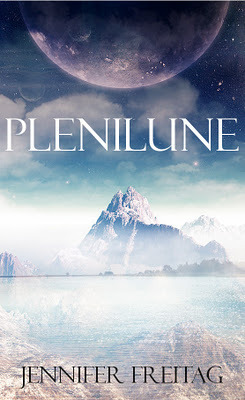 I've been tagged! I didn't realize it at the time. I had to be told. I didn't feel anything. But apparently I have been really, truly tagged, and I'm really, truly flattered. Rachel, from The Inkpen Authoress, realizing the difficulty of engaging lookers-on when writing a story, got it into her head to put together a list of questions for any current works in progress that will help both lookers-on and writers to better be acquainted with their novels. She tagged me, and if I could just warm my fingers enough so I don't fear snapping them off while I type, I'll try to answer these questions. In case there was any confusion, I am doing
I've been tagged! I didn't realize it at the time. I had to be told. I didn't feel anything. But apparently I have been really, truly tagged, and I'm really, truly flattered. Rachel, from The Inkpen Authoress, realizing the difficulty of engaging lookers-on when writing a story, got it into her head to put together a list of questions for any current works in progress that will help both lookers-on and writers to better be acquainted with their novels. She tagged me, and if I could just warm my fingers enough so I don't fear snapping them off while I type, I'll try to answer these questions. In case there was any confusion, I am doingPlenilune
"You might call it that," Rupert said.
1. Who are the main characters?
Main characters, ah, gee… Of course you will have met Margaret Coventry. You haven't? She's my main character, a stiff, proper, if feisty young English lady of 1844. Other main characters include Rupert de la Mare, the suitor she does not want and cannot escape; Dammerung, a legendary war-lord who seems to have gone and got himself killed; Skander Rime, a cousin and neighbour; and a cheeky fox. I might add in old Hobden, but he wavers between the lines of first and secondary characters.
2. How did you get the idea for this story?
Get. Get? This one forced its existence upon me and then left me to yank some kind of shape for it out of my mind. As I finished up Adamantine I realized Adamant Firethorne's cousin needed a story too. I had practically wedged myself into a corner with the need to write the story, only I didn't have one. I had to make it. As my stories usually come to me in their own spates of inspiration, I'm rather proud at what my genius managed to create on the spur of an hour-long moment. And, too, I had always wanted to write this kind of story but up until that moment I had not found the proper plot in which to put my place. Now I have.
3. What genre is this story?
This is most definitely fantasy. It would be nothing short of fantastic, quite literally, if such events could occur. Alas, these spirits live only in cloven pines—er, books.
4. Describe your book in three thoughts:
Margaret trying to get home and realizing she does not know what or where home is anymore. A duel between two men that becomes a chess game on a living scale. Desperate times call for desperate measures.
5. The bit that describes an obscure piece of real life best:
Everything seemed impossibly long and far away, as though the House, like a dog in its sleep, stretched out in the night and was twice as big again as it ought to be.
6. The funniest line said by a side-character thus far:
"I am heartily sorry to meet you, Miss Coventry." The fox gave a little sniff and held out a paw, which Margaret came forward and took, feeling very surreal as she did so.
7. Your favourite piece of description:
Overhead was the bulk of earth, dark in its massiveness, the crest of it ablaze with blue light like some enormous frightened cat on All Hallows' Eve stiffened and hackled in the heavens. And beyond earth's arched figure, beyond the long rays of light that broke off its back, stair-stepped the stars of heaven: upward and deeper, so that to Margaret, who had not bothered before to look beyond the inner ring of earth, it was like looking into a pool, a deep pool, a high pool, that went on infinitely until the end of time where eternity hung its veil so that little people like herself might not look in and die.
8. Your biggest fear in the writing of this story:
My biggest fear is probably that I won't be able to capture my main characters to my satisfaction. They are so big and so bold and so important that I feel rather small in their shadows.
9. Last full sentence you wrote:
"In spring, when the Murklestrath is in full spate and the nomadic blood of the Carmarthen is too, then perhaps I go with my lord when my lord goes out to defend our borders."
10. Favourite character thus far:
Thus far. I like that caveat. Thus far. My favourite character thus far… No, I don't like this caveat any more. It's a jostle between the fox, Skander Rime, and—of all people—the secondary figure of Skander's manservant.
11. What books have been written or have you read that are similar in style and flavour to your novel?
I would like to meet someone who has read a book that hasn't been written… I don't read a lot of fantasy, and consequently my fantasies are rather straight-forward save that points here and there and usually their basic premises are impossible. The only books I can think of which I have read that bear similarities in any way to Plenilune are Rosemary Sutcliff's Knight's Fee and E. R. Eddison's The Worm Ouroboros; but even those don't help much, as they were only the critical mass which helped me launch into writing Plenilune. Hmph. Inspiration. What a tricky business.
12. If it was destined to become a book on tape, who would you wish to read it?
Oh, boy, this question has never occurred to me before. Possibly Elisabeth Sladen, but since she is dead now I may have to leave this question blank.
It is my understanding that one, once tagged, must tag others. So I had better do that, hadn't I?
Anna from Insanity Comes Naturally
Megan from Poetry of Lost Things
Mirriam from Thoughts of a Shieldmaiden
Skander pulled on the front of his tunic. "A pretty trick," he sniffed wryly.
November 28, 2011
Lies of Poets, Child, Lies of Poets
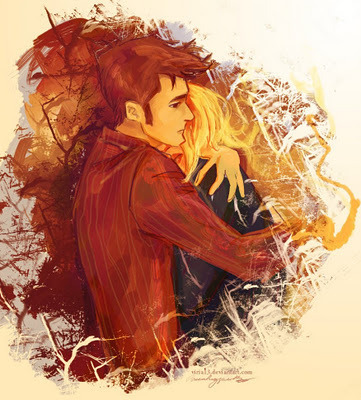 I like fairy tales. I like hero stories. I like them because, as G.K. Chesterton points out, they teach us something about reality. It teaches us that good and evil exist, really and truly, and that good can conquer evil, really and truly. Fairy tales are a tell-tale hymn of hope back of all our imaginations. We believe in the hero at high noon, we believe in the champion standing in the gap. We believe in dark nights giving way to bright dawns because everywhere we look the blueprint of such a story is staring us in the face.
I like fairy tales. I like hero stories. I like them because, as G.K. Chesterton points out, they teach us something about reality. It teaches us that good and evil exist, really and truly, and that good can conquer evil, really and truly. Fairy tales are a tell-tale hymn of hope back of all our imaginations. We believe in the hero at high noon, we believe in the champion standing in the gap. We believe in dark nights giving way to bright dawns because everywhere we look the blueprint of such a story is staring us in the face.I like fairy tales and hero stories, but when I write them I learn something. It's hard to write the hero. It's hard to write the fairy. I know. My hero, my fairy, they have to be looked at from the outside because what goes on inside them is so inscrutable. But is it? Is it really impossible for us to look inside?
I hear boys talk of the army and war like it's a grand thing. I hear people talk of police work like it's glory. And something inside of me aches when I hear their words because I know the hero, I know the fairy. I've written them. I've walked with them. I've stared in their eyes and seen the haunted looks, the half-conscious bitterness about their smiles. It isn't glory. It isn't grand. It's hard. Everything depends on the hero, the fate of the day hangs in the hands of the fairy, and that weighs. It isn't all backlight and modeling snapshots. It's hard. It's real.
From a distance we see them uplifted like some kind of pantheon, perfect, capable of taking anything on and winning the day. They always look strong. They never cry. We're not even sure if they can bleed. They seem to pass through the midst of this world without anything seeming to brush them. But if you get close, if you look into their eyes, you realize that isn't true. We write about the glory of a hero's victory and the courage of the fairy, but do we ever write about the pain? Do we ever write about the weight of responsibility, of the fear, of the heartache? Do we write those moments when despair gets its claws into the hero's heart and presses on his lungs like Apollyon's knee? Do we ever write about those moments when it is almost all the hero can do not to run and hide and cry like a child because everything depends on him, and because everything seems so impossible?
It's hard to write that kind of thing. It's almost indecent to bare someone's heart like that, even though it is just a character. But sometimes we need to know. Sometimes we need to hear that a hero believes, only he needs help in his unbelief. Sometimes we need to know that Jesus wept. Sometimes we need to know that life hurts the heroes too. We need to know that victory comes at a cost, and that cost leaves scars. Sometimes the struggle isn't for a world, or a people; sometimes it is for a family, for a single day, for the day after that, and the day after that. I know heroes, heroes that aren't made of ink but of flesh and blood, and they do bleed, and they do cry, and they hide it all away behind their faces that seem to be untouched by the winds of this world. But I know. I know they have heartache. I know they break and tear and unravel in their insides while they try to hold their world together around them. I know my heroes hurt, and somehow...somehow that makes them better heroes than before.
Do we know that? Being a hero isn't glory, it's guts. Being a hero isn't triumph, it's toil. Being a hero is hurting, being a hero is dying. It's written in the blueprint of the fairy tale, of the hero story, if only we look deep enough to see it. And after that we can remember that it is glory and triumph and healing and living, because that is written in the blueprint too.
truly, truly I say to you, unless a grain of wheat falls into the earth and dies, it remains alone
but if it dies, it bears much fruit
November 21, 2011
Salt and Pepper Words: Scribble Samples
 I'm a little dazed. We had our annual Thanksgiving dinner with the church family yesterday, and my husband and I signed up to tackle a turkey. Which means we didn't get any rest on Sunday. So I'm a little dazed. Today is technically laundry day, which means doing laundry, but so far I have managed only to wrap some Christmas presents and read in The Reformers and Their Stepchildren. Add a nap to that, and I have not had a very productive Monday, but since I missed Sunday's rest and I have elbow-room to take Monday off(ish), I'm going to think nothing of it.
I'm a little dazed. We had our annual Thanksgiving dinner with the church family yesterday, and my husband and I signed up to tackle a turkey. Which means we didn't get any rest on Sunday. So I'm a little dazed. Today is technically laundry day, which means doing laundry, but so far I have managed only to wrap some Christmas presents and read in The Reformers and Their Stepchildren. Add a nap to that, and I have not had a very productive Monday, but since I missed Sunday's rest and I have elbow-room to take Monday off(ish), I'm going to think nothing of it.So I'm going to take this opportunity to give you a peppering dosage of what I have been up to and what I have been writing, and what I have written. As Katie said about her own dosage (and she my inspiration), "they're Something, at least - and that is a good sight better than nothing."
scribbles at a glance
The second in command stiffened by his commanding officer. The wind kicked the commander's plume to one side, streaming it out like the tail of a horse in full gallop. Rhodri was silent. A sound, an irregular clink and rattle, drew Adamant's gaze upward. Over the central building flew the flag of Faerie: a great red banner, tattered at the edges, but still blood-red, with a black, hollow-eyed raven rampant on the crimson. The metal weight of its sheet was swaying in the wind and banging an uneven tattoo against its pole. They must listen, she thought. Then, I am so hungry.
Adamantine
He shook his head, and her words seemed to have only driven him farther away than ever. "It is uncommon grace that Eikin needs, and God has not given me any sort."
Adamantine
Rupert's image was all sleepy power and there was a light laugh in his voice when he replied. "I know full well where I stand in your heart, Skander. Did you not throw down this obstacle of a wife in front of me because of it? But though you may dislike me, take me not for a blackguard."
"I'll take you as you are," said Skander coldly.
Plenilune
Behind them on the sidewise-blowing wind came the sound of Skander's hunter and the two dogs coming back to them; with them on the wind came the thin, high scent of late-blooming heather. Down there in that garth that two years ago and for three years had been Rupert de la Mare's Manor, thought Margaret with a sudden and inexplicable touch of sadness, they would be making perry out of the little brown half-rotten pears of the little brown half-wild pear trees.
Plenilune
"How poorly you have sketched my nature!" she said with a flippant and caustic tone. "I have no objection to balls and parties. What is the point of shining if there is no sky to shine in?"
Plenilune
He appeared that morning, not in grim costume to reflect the fate of Plenilune laid out on the blade of a sword, but in a jacket of sparkling white, pristine, supple, comfortable, and stitched with bravado.
Plenilune
and lastly, a quote which is not mine
Christians are not distinct from the rest of men in country or language or customs. For neither do they dwell anywhere in special cities of their own nor do they use a different language, nor practice a conspicuous manner of life. . . But dwelling as they do in Hellenic and in barbaric cities, as each man's lot is, and following the customs of the country in dress and food and the rest of life, the manner of conduct which they display is wonderful and confessedly beyond belief. They inhabit their own fatherland, but as sojourners; they participate in everything as citizens, and endure everything as foreigners. Every foreign country is to them a fatherland and every fatherland is foreign.
The Epistle to Diognetus
November 14, 2011
Like a Merchant Seeking Pearls
 Noble and well-educated souls have no such high opinion of riches, beauty, strength, and other such like advantages, as to value themselves for them, or despise those that want them: and as for inward worth and real goodness, the sense they have of the divine perfections makes them think very meanly of any thing they have hitherto attained, and be still endeavouring to surmount themselves, and make nearer approaches to those infinite excellencies which they admire.
Noble and well-educated souls have no such high opinion of riches, beauty, strength, and other such like advantages, as to value themselves for them, or despise those that want them: and as for inward worth and real goodness, the sense they have of the divine perfections makes them think very meanly of any thing they have hitherto attained, and be still endeavouring to surmount themselves, and make nearer approaches to those infinite excellencies which they admire.The Life of God in the Soul of Man,
Henry Scougal
I came to this particular passage rather providentially in my reading of The Life of God in the Soul of Man. Henry Scougal puts it as eloquently as Paul puts it bluntly: that all our temporal achievements, whether physical or intellectual, are passing, shallow, thin, and unworthy of praise when compared to the solid perfection of God. I think any one of us would readily, and heartily, admit to that, and I think any one of us would also admit to the infrequency with which we acknowledge the inferiority of our conquests.
Because I am published, and plan to be published again, I will occasionally look around publishing house websites to get an idea of who the authors are out there, what is going in the market, etc. Not that I have been much in the habit of catering to crowds, but I like to know, you know. But as I was perusing a site the other day, a site geared exclusively to publishing works under the heading of "Christian," I discovered something rather appalling and sadly common. As I read the author biography blurbs, who they are, where they came from, what they do, I realized that only one mentioned God. Only one mentioned God in a capacity of singular devotion. Only one author's blurb addressed his purpose as unveiling the Word of God. All the others were full of credentials (he studied here, he has preached to so many people, she runs this organization, she is a founder of this group). Each one so full of man-oriented, inferior conquests.
I could understand, and I would readily forgive, this if it were found on a secular website, or a publishing house that went both ways, "secular" as well as "Christian." But for a site that so ardently sketches itself out as catering to the Christian public, my poor little gullible mind could scarcely believe it. The characters on the screen spelled out the marketing mantras of this world. The credentials of these authors were all about their worldly aspirations and achievements.
Let's not down-play the good of some of these achievements. It's a good thing to have gone through the structure of seminary training, or to have the rigors of fostering a congregation under one's belt. But when it comes to speaking and writing the truth (which is, I assume, what writers who adhere to Christ mean to do) do these credentials hold a candle to a knowledge of the inward worth and real goodness of the divine perfections? Tell me, what really matters in the Kingdom of Heaven? Wealth? Eloquence? The best training seminaries have to offer? When you are called to give an account for the deeds done in the flesh, will you find that you hung out your shingle on the basis of your worldly triumphs ("Lord! Lord! we did all these things in your name!"), or will you find that your credentials were in accordance with the pursuit of holiness?
My father tells the story of his sojourn, like Dante in The Inferno, into a Christian bookstore. In his perusal of the shelves he heard two gentlemen speaking behind him. The first asked how he would know a good book, and the second replied, "Look for this symbol." As my father tells the story he says, "Of course at that point I had to turn around." It was the colophon of the publishing house Banner of Truth, an image of the preacher George Whitfield. In such a simple image, stalwart and be-robed, the publishing house conveys a grim, joyful adherence not to large congregations or stellar education, but to men through the ages who have clung to the truth of God's word above all else. Those are their credentials. That is their eloquence. That is their wealth. Not any station this world has to offer, but the lasting knowledge and growth in knowledge of a truth which outlasts all.
When I am asked "What makes you think that you can write?" I hope my credentials are simply that:
"I know what is valuable in the Kingdom of Heaven."
November 7, 2011
Completely Mental
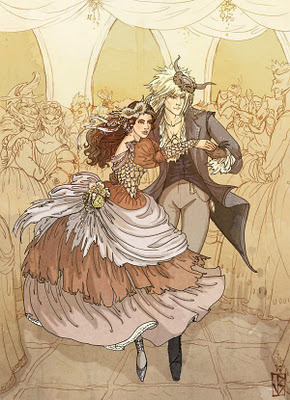 For Anna - because, well, she can dance.
For Anna - because, well, she can dance.The music was Mozart and, though instrumental, was far too fast. I resisted the urge to get up and pace, an urge I have found to plague me strongly in the past few hours. It was really pathetic, I told myself, how worked up I was getting about something so simple. It wasn't as if there was anyone about to laugh at me. The things one does, I told myself, for research!
"Ahem."
My heart froze in my chest. Irreproachably dressed, as if this were serious, he stood in the doorway, leaning a little on the frame to get the most of his weight off his legs. Good-naturedly he had protested the endeavour at first - the advancing cold made him ache - but I had been stupidly persistent and in the end he had given in. I wished now I had not been so forward.
I frowned. "You didn't tell me you were getting all dressed up for this," I said with a touch of irritation in my tone. "I can't possibly stand up in my jeans with you."
"I reserve my views on jeans," he said ominously. Then, with a little sideways twist of the shoulders, he added, "Your hair went up so nicely this morning, I thought it a shame to have you wrestle into your gown. I know you get so very mithered about that. Now, are you serious or aren't you?"
"I - hmm," I said intelligently, and kept my seat.
He held out his left hand imperiously. "Come along, Half-pint."
He had the way about him. I found it impossible to refuse. With a prodigious sigh I rose, my heart still uncomfortably where my throat should be; in three steps I was across the room. A moment later, with my eyes shut as though I were expecting it to sting a little - maybe I did - I put my hand in his. When he made no move, I cracked one eye open. That light, mocking smile of his that had more to do with his eyes than his mouth was flashing at me. "Honestly."
I pulled myself together. "Should I put on shoes for this?"
"I will try not to step on your toes."
Hand in hand, he led me into the next room where there was more area to move about. Pathetically I was shaking a little, from embarrassment and excitement. In reflection, I thought it perfect. She would be feeling much the same feelings herself, under her own circumstances. Thus far, research was going well.
If only I had thought to put on a gown.
My companion took his position and wrestled me gently into my own. The music from the other room was faint now; I only heard little snatches of it. For a moment the sheer, stark reality of the room jostled with my imagination: sofas refused to give way to polished mahogany tables and a piano; the carpet refused to give way to a polished ballroom floor. With grim determination I took a heavy intake of breath and conjured them up for all I was worth, afraid all the while that even the slightest movement of mine would shatter them.
My companion maneuvered my hand onto his arm and took a firm but gentle hold of me. We were ready. I felt him pause, as if listening to the beat in his own head. I kept my eyes fixed on his as if I were grasping a life-line. He counted silently, then suddenly broke off with a splutter, which was very unlike him.
"You look like a cornered rabbit. Relax. I can't dance across from a face like that. Just relax. Think of your feet making patterns in ink, the way your fingers do. With me, now."
And suddenly we were moving. I was half a heartbeat behind him, which made for an awkward beginning. He stepped forward - which foot was mine? - and I stepped backward just as he was gliding to the side. Hurriedly I caught up with him, still as stiff as a poker, my eyes instantly glued on our feet. I began to worry now that he would step on my feet. Unexpectedly he pulled me forward, to the side again, and even turned about in step. I always seemed that half-heartbeat behind; my stomach was beginning to knot.
"Look at me," he said. With a painful hesitation I tore my eyes from our feet. My gaze trembled on his own. "Look at me. Dancing to ink, Half-pint. This is what you do every day. It's just like that. Look at me. Let me guide you."
He was wearing his gloves, his black doeskin gloves, and for that I was thankful; my hands were growing rather sweaty with all this strain. But I cared. Hadn't I told Uncle Raymond that once? If I cared, I stuck to it. For all I felt like an idiot, I was going to stick to it. Obediently I kept my eyes on his, moved when he moved, stiffly, stupidly, my heart in my throat...and then I felt it. It was beginning to flow. Over and over, backward and forward, gliding and turning, backward and forward, gliding and turning. Like Ben-Hur and his horses, altogether one with the lives of themselves flowing in the reins, he and I somehow managed to grasp the genius of the dance. A smile cracked my pensive lips. Dancing to ink, he had said: patterns of ink. Oh, the sofas were gone. The carpet vanished. I was in a Lookinglass ballroom, in a gorgeous red gown, and everywhere there were lights and laughter and the clinking of glass on glass - and perhaps even, if I listened hard (though I did not have much leisure to), the accompaniment of music. I knew, in that annoying back part of my mind which had a way of hem-hemming reality at my elbow, that I was dancing truly horribly in a rather small enclosure, but somehow that did not matter at all. I had ink in my veins. I could feel it rushing through with the beat of my heart.
Dancing to ink. Patterns in ink.
Just at the right moment he stopped, giving me one last turn while the realness of the carpet flashed hot-red into my bare feet, and we stood apart, panting a little. The tables and glass and music were gone. It was just the living room now, oddly bleak after the colour of my imagination. But even now that did not matter either.
My companion gave a little philosophical sniff and pulled at the hem of his coat, adjusting it back into position. "Well, amphibious girl," he asked, "was the research satisfactory?"
"Yes," I gasped, hands on knees. "I think I have the pattern for the scene now. What I do for my stories! I'm completely mental."
"Don't flatter yourself." He wilted gracefully into a chair and leaned his head back against the wall. "We knew that already."
"Ppthbt," I said childishly.
November 1, 2011
Spacers Between Kingdom Tiles
 A little over a week ago Megan, on a Sunday's whim, scribbled down a few of the small, fleeting things that are the delicate pattern of beauty in her life. Little things: little things that somehow matter. Indi, the main character of my published work The Shadow Things, reflects on the problem of the little things:
A little over a week ago Megan, on a Sunday's whim, scribbled down a few of the small, fleeting things that are the delicate pattern of beauty in her life. Little things: little things that somehow matter. Indi, the main character of my published work The Shadow Things, reflects on the problem of the little things:"Surely there is something that brings the rain and the dry," he said to a little ant toiling by his foot. "Look, even you find food to eat. Who watches over you? Surely not the gods. They are almost too busy and unfeeling to care for us, and when they touch us, it is to kill us."
Who cares about the little things? Who makes the little things that are the exquisite backdrop of our lives? God does, whose power keeps the paradox of the atom from flying all to pieces, whose finger inscribes the invisible lines between the stars. God does, and Megan took the time on a Sunday's whim to chart out some of the little things in her life. It was a treat to read, as I am sure it was a treat to write; she invited others to scribble down a list of their own little things as well. I thought...well, perhaps I might.
Perhaps I might. I felt uneasy, as though I were borrowing her thunder. But I kept thinking about it, dutiful, ever anxious to enjoy myself since I thought this would be an enjoyable exercise of the mind. And then a strange revelation broke slowly over me. Do you remember, as a child, how large everything seemed to you? A single turkey seemed to me a positive ostrich, towering and grotesque, intent on running me off the dirty tract of farm and pecking my hair out. Dogs were like ponies. Ponies were like elephants (I remember the horrified twist in my gut when I was made to trot in my first horse-back riding lesson). When you are a child, everything breaks on your vision as enormous.
And it still does that to me.
I almost hate to do this exercise because it will peel back all my cool, demure layers (which really are a part of me) and get down to that inner core where, let's face it, I'm still just a child. Andrew Peterson sings about the window in the world: have you ever wondered what the window itself feels? Maybe like being run through, run through and broken up on and rattled and overwhelmed and at the same time trying to channel all that goodness... I look at autumn like a man newly stepped onto an undiscovered planet. Every autumn. Every autumn a new planet. Nothing is little. Every cup of tea is a fresh cup of amber. Everything is like living stained glass through which the genius of Christ's light is shining around me. Nothing is little. So how do I remember the little things? Every sharp detail, every piece of mosaic, every thread I can pinch between my fingers that is woven into my life, is enormous. I'm such a child. Here are some of my enormous little things.
catching a fresh breeze in my facethe Kingdomseeing the sunset rays streaming over the cloudsmy sister telling me "I love you" when I am upsetthe hello-goodbye kisses from my mother and fathermy husband kissing my hand, or ruffling my hairwriting a passage so that it rings truediscovering the narratives of the Scriptures coming to life before my mind's eyemy father's teachingholding a conversation in quotes from books and movies with my familymy mother's cookingmy sister-in-law's dessertswearing my husband's sweatersfinding letters in the mailbox from my friendsUncle Raymond laughing at methe worlds inside my head - fells and dales, downs, river valleys, seashores, farms and quiet streets...Rhodricandle-flamethe colour of a blue jay's coatthe autumn cry of Canadian geesethe little red light that lives far down in a glass of winethe surf-sound of the wind in the treesthe giddiness and sudden seriousness of the Tenth Doctorthe sound of waves falling, lulling me to sleepSundaygoing to cut down and put up my parents' Christmas treeapple-pickingwhen only my husband 'gets' what I mean (fiery horses)the pile of coats on my parent's coat-rack Saturday evenings when we all visitfeeling the living throb of my church through my spiritopening Christmas presents with my throwing-knifelying awake Christmas morning, as much a child as ever with excitementseeing a constellation I knowsmelling woodsmokeWednesday afternoon walksmy morning cup of tea
These are the colours and brush-strokes that make up my world.
October 31, 2011
Dramatis Personae - Plenilune
All right, all right. I don't own any of these pictures except - nope, I don't own any of these pictures, but I do own the characters. Very wibbly wobbly. Anyway, enjoy the creative endeavours of a girl overdosed on sea-salt and cracked-pepper chips. Cheers!
Avaunt, sire, avaunt!
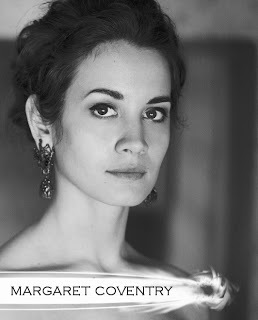 Margaret Coventry
Margaret CoventryThe main character of Plenilune. English, twenty, too reserved to be pretty and too pretty to be left alone, Margaret steps onto the scene as the dutiful if unwilling victim of her mother's insistent attempts to make her marry and marry well. She has very little faith in her skills at procuring a husband, she has every intention, all the same, of doing so - partly to spite her own mother. What she had not expected was that a suitor has already had his eye on her for some time and, under the very nose of a rainstorm, without family or friends ever knowing, whisks Margaret clean away to woo her with an iron hand occasionally hid inside a velvet glove. Stubborn, English, proud to her core, Margaret resists with all the will she has and seeks to return home. Even less expectant is the discovery that she has no real home at all.
[image error] Rupert de la Mare
Every inch and more a match for Margaret's demure stubbornness, Rupert meets her with chilly gallantry, chipping away at her defenses by the sheer impact of his presence, sudden kindness, and equally as sudden ferocity. He has no little plans for the future of his Honor; his temperament and station allow him ample ambition. Unfortunately his temperament is one that rubs people's fur all wrong, and his cousin, in a desperate bid to stop his head-long career for power, lays him a wager which, if he cannot win, he cannot hold power. Smarting from the insolence, and remembering with a grudge his cousin's move, Rupert nevertheless undertakes to win the wager.
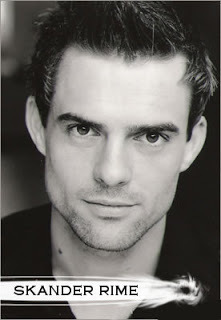 Skander Rime
Skander RimeSkander is a sharp if rather young lord, holding the Honour of Capys from his seat in Lookinglass. His ready wit and gentle, amiable demeanour belie a taste for hunting and war. Though friendly he is not particularly sociable, and after his first distrustful encounter with Margaret he finds a kindred sort of spirit in her coy but stalwart personality. Though he is not sure she feels any sort of friendship in return, he feels sorry for her and sticks his neck out for her, trying to dissuade Rupert from his course - earning him only a deeper enmity with the young lord of Marenové. With the future of Plenilune appearing more and more uncertain on the horizon, Skander feels caught in the middle, concerned for Margaret's welfare and at the same time loathe to spark strife with so powerful an Honour as Marenové.
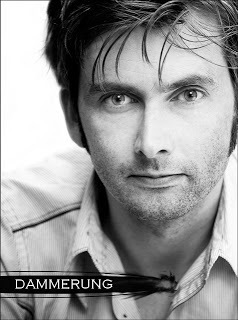 Dammerung
DammerungHe was nicknamed War-wolf at a young age for his natural skill in war, his flippant, almost thoughtless ability to see and deliver a crushing martial blow, and his propensity for stalking, with a mirthless sort of cheer, through the ranks of everyone and everything as if only he were material, and everything else but mist. Though counted by age among the young bucks of Plenilune he stands by his own consent and the common consent of the other lords at the head of them all, a living sort of legend-figure with the shadow of death following after him.
[image error] The Fox
The fox is a diminutive character, but armed with immense cheek and irreverence. He styles himself as Rupert's ex-jester, though, contrarily, he makes more fun of himself than of his grim master. Being a creature as much chained as she, among all Margaret's acquaintances the fox understands her best and makes himself her closest friend. He is twice as protective of Margaret as Skander Rime, but significantly less capable of doing anything about it, which irritates him extremely. Cheeky, irreverent, dashing (and knowing that he is dashing) he does his best to keep up Margaret's spirits until such time as they can find a way to save her.
* * * * *
This is, of course, not an exhaustive list, but here are the pivotal characters, at the very least, with all their thinly-sketched portraits of personality and two-dimensional analysis covered in little crumbs of chips and tasting unusually strongly of salt. I am proud to say I did not waste time at this exercise, as my novel boasts of an additional near-two-thousand words, which is all I meant to write today. I even got a nap in. Not bad.
Le douce, mon amy, le douce.
October 28, 2011
The Regime
Cato the Elder
I have a horrible memory. Everything blurs together after awhile when your mind is travelling at breakneck speed through half a dozen time periods and as many stories at once... I'm sure you know the feeling. It must have been somewhere between watching the Harry Potter films and some of the recent Marvel productions (real high-brow entertainment, I know, I know) when it dawned on me the wastefulness of these villains. If you insist on barking "Avada Kedavra" left and right, or smashing up whole sections of a town (and the people in the town), when the day is over...who will be left for you to rule over? It suddenly seemed stupid. If you kill a whole people you won't have a people to rule over - and isn't that what you want? Power, recognition, control, fame, the heights of worldly aspirations? But when chanticleer has killed all the other roosters with his spurs, there is no one to applaud him when he stands on the top of the dung-heap. There seemed to be no good point in killing so many people. Even such magnificent works as The Lord of the Rings bothered me with this apparent lack of purpose.
Puzzled, bewildered, I put the question to my husband. Now, my husband can bluff like the devil and I can be as gullible as a child who was born yesterday. I complained that it made sense to decimate a conquered people to teach them who was boss, but you didn't just wholesale slaughter them unless they had proven really stiff-necked (see Cato). He told me this was because these recent stories are built off the Nazi regime and the fixation, not just on world domination (that's an old one) but on the wholesale slaughter of otherwise innocent people groups.
Let's not kid ourselves. Politics until a fairly recent era has always been full of back-stabbing, double-crossing, cloaks and daggers, smoke and mirrors. Politics still has all that, but in our country, at the very least, you are unlikely to find an appointed member of government communally stabbed to death beneath a statue of one of our founding patrons. But what about politics on an economic and inter-provincial scale? We are going to assume that the reason for invasion of a people is for conquest, not for an escape from a depleted farmland or displacement by other moving peoples. We are going to assume that the sword is being used to gain greater power for the hand that wields it.
In general, if I were to invade a people in a large, lush river valley, do you think it would be expedient for me to slaughter them all because, well, they aren't of my people and I want the land for myself? It might be. I might wipe them out and plant my own soldiers there. But I need my soldiers and they aren't time-expired from the army yet, so what do I do? Leave a contingent to hold the peace and let the natives continue farming, harvesting, breeding and slaughtering, and make them pay with the fruit of their land (my land) as tribute. Ta da! National income.
I'm addressing this to fantasy writers because historical fiction often has a lot of parameters laid out already. When you make a villain, and you want to go on the war-path, you have to ask yourself: "Why? And how?" Is this for world domination and rule, or a psychopath's need to kill everything that doesn't say "Yes, sir"? (These are not always mutually exclusive.) Does your villain have a god-complex, or an ego the size of Anatolia, which makes him think that he is the best thing that has ever happened to his country and that he, and he alone, will bring it ultimate glory? Remember, it is unlikely that anyone will act passionately thinking that what he is doing is wrong. I am not going to kill Caesar thinking that killing Caesar will damage the Republic. I am going to kill Caesar because I believe in my heart of hearts that Caesar is a menace to the Republic and that he must be put away. (I might do it for money, though.) I'm not going to secede because I want to break up the Union, I'm going to secede because I think the Union is unfair and oppressive. I'm not going to hunt down and kill the Scarlet Pimpernel because I hate Englishmen, I'm going to hunt down and kill the Scarlet Pimpernel because I believe the aristocracy is a plague upon France (and because I'm French and I've always hated the English). I may be dead wrong, but by golly I'm going to think I'm right. So half the trouble is making your villain reasonable, making him more than a mere power-hungry killing machine, making him more than the poster-child of the Regime. Villains are more than people out to kill everyone else.
Rationality, purpose, a political and economic arena. The regime that stories like The Lord of the Rings were inspired by wielded the sword with purpose too, and it had a reason for what it was doing, a reason it thought was right. But we have to go back and make our reasons in our stories; we can't just hang our stories upon the horror of a massive steam-rolling villain trundling across the landscape, leaving needless and brainless desolation in its wake. And the stronger the validity of the villain's reason, the stronger the villain himself. He may be wrong, he may be unjust, he may be completely blinded by his false ideals, but at least he is more than a marching killing machine. If he wants to be king, he needs people to rule; if he wants his way, he must fight with ideas. He can be a complete devil, but even the devil knows how to be cunning.
" 'Bout fifty percent of the human race is middle man, and they don't take kindly to being eliminated."



